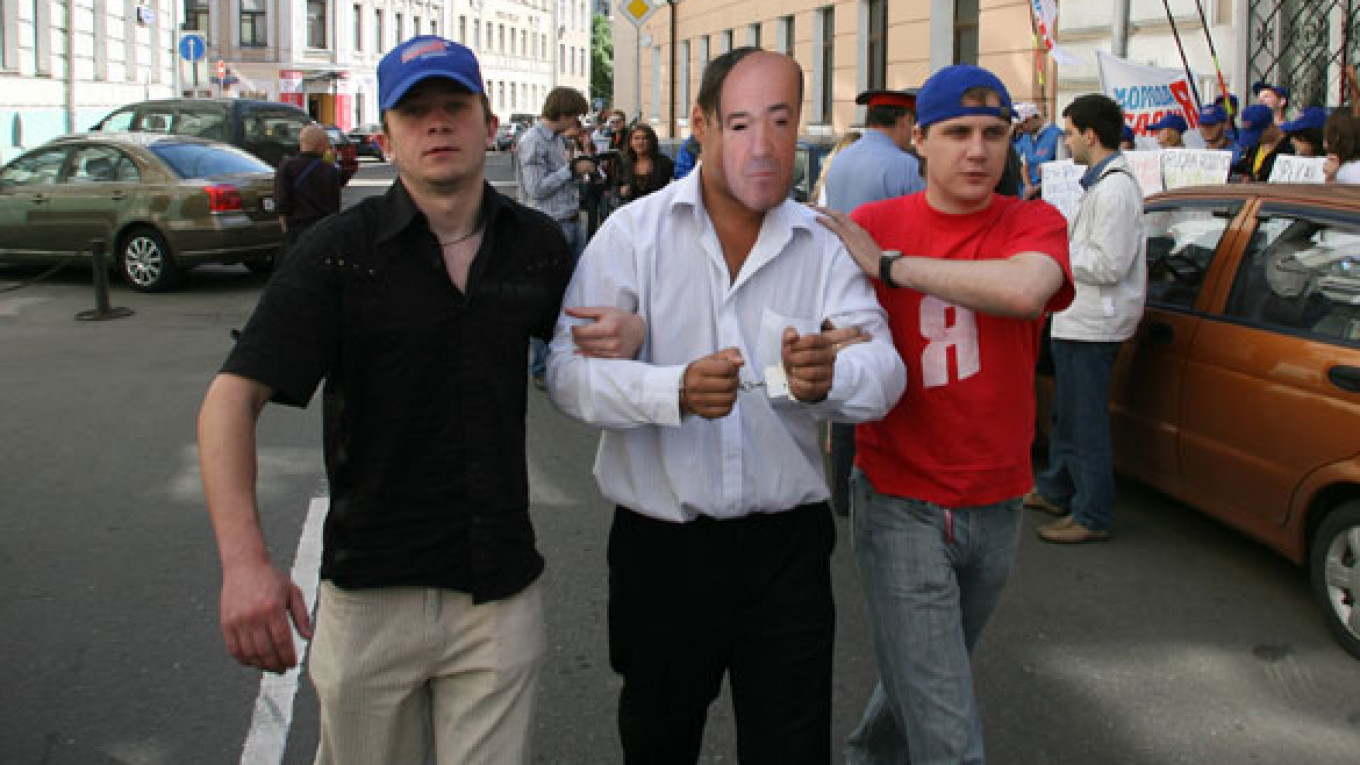Self-exiled billionaire Boris Berezovsky, who recently pledged a 50 million ruble ($1.5 million) bounty for the arrest of President Vladimir Putin, is being investigated for "calling on Russian citizens to commit acts of mass disorder," the Investigative Committee said Tuesday.
The committee opened two separate criminal cases against the tycoon based on comments he made on LiveJournal and in a letter briefly published on a left-leaning radio station's website. If charged and convicted, Berezovsky, 67, faces two years in prison.
One case is over an entry in Berezovsky's LiveJournal blog in April that called for Russian citizens to arrest Putin before the presidential inauguration, Investigative Committee spokesman Vladimir Markin said Tuesday.
"The essence of the text demonstrates that Berezovsky has called on Russian citizens to commit acts of mass disorder … to block the inauguration of the legally elected Russian president," Markin said, Interfax reported.
In that text, Berezovsky proposed the hefty reward for arresting Putin. "I know that what was possible for the people of Libya to overthrow the tyrant can be done by the people of Russia," Berezovsky wrote in the entry. He did not comment on the investigation Tuesday.
Markin said the second case was opened on similar accusations, connected to statements Berezovsky made in an open letter in February.
The letter, which called on young Russians to become the "legitimate force to overthrow the criminal and deceitful regime" was published on Ekho Moskvy's website but taken down shortly thereafter.
Analysts doubt, however, that the once-powerful insider who was deputy head of the Security Council under President Boris Yeltsin has any impact on Russian politics today.
Berezovsky "doesn't have any influence on current politics," said Pavel Salin, a senior expert with the Center for Current Politics. "While the old breed of opposition leaders negotiated with him, he doesn't have any connections to the younger ones."
Berezovsky is known for "phantom political projects," an opposition source said. "In the past he would give 20 kopeks and tell everyone he gave 100 rubles," said the source, who spoke on condition of anonymity because of the sensitivity of the matter. "If he would finance Navalny, it would be a step."
After helping Putin assume power in the early 2000s, Berezovsky soon fell out of favor with the Kremlin and fled to Britain, where he was granted political refugee status in 2003.
This is not the first time that Berezovsky faces charges after fleeing to Britain. In 2010, a Moscow region court sentenced Berezovsky to 13 years in prison on charges of defrauding AvtoVAZ in the 1990s. In 2007, Berezovsky was sentenced to six years on charges of embezzling funds from Aeroflot.
While Berezovsky has financed opposition groups, including the now-defunct Liberal Russia party, and even considered forming an anti-Putin alliance with the Communists, he is not currently involved with the opposition.
Independent political expert Stanislav Belkovsky, who dined with Berezovsky three months ago in London, said the businessman "lives out of touch with the current Russian realities," as exemplified by a recent appeal by Berezovsky to Russian Orthodox Patriarch Kirill to form a committee of national salvation.
Berezovsky, who once controlled ORT, now Channel One, and had stakes in the Sibneft oil company and the RusAl aluminum giant, now has no known business assets in Russia. His only tie to the country appears to be his membership in the Russian Academy of Sciences, granted to him as a mathematician in 1991.
Some experts say Berezovsky, whose wealth Forbes magazine estimated at $1.3 billion in 2009 but who has not made the billionaire list since then, is not involved with the current opposition largely due to financial reasons. He has been engaged in costly lawsuits, including one with former business partner Roman Abramovich.
According to that suit, which is still pending in London's High Court, Berezovsky is demanding $5.5 billon in damages over what he claims were disadvantageous deals that Abramovich made under Putin's influence.
"You can say that [Berezovsky] doesn't have much, since he is involved in many lawsuits," Belkovsky said.
The cases against Berezovsky possibly stem from a reaction to the protest movement in general, said Salin from the Center for Current Politics. Putin's personal attitude to Berezovsky may have played a role, he said. "They reacted as a measure of precaution."
Salin's comments were echoed by Solidarity member Mark Feigin. "Berezovsky wants to act like in the 1990s, and it looks like people acting against him are from the same era," he said.
Such a move against Berezovsky actually works in his favor, Belkovsky said. "It is a plus for him, being a political refugee," he said.
A Message from The Moscow Times:
Dear readers,
We are facing unprecedented challenges. Russia's Prosecutor General's Office has designated The Moscow Times as an "undesirable" organization, criminalizing our work and putting our staff at risk of prosecution. This follows our earlier unjust labeling as a "foreign agent."
These actions are direct attempts to silence independent journalism in Russia. The authorities claim our work "discredits the decisions of the Russian leadership." We see things differently: we strive to provide accurate, unbiased reporting on Russia.
We, the journalists of The Moscow Times, refuse to be silenced. But to continue our work, we need your help.
Your support, no matter how small, makes a world of difference. If you can, please support us monthly starting from just $2. It's quick to set up, and every contribution makes a significant impact.
By supporting The Moscow Times, you're defending open, independent journalism in the face of repression. Thank you for standing with us.
Remind me later.


